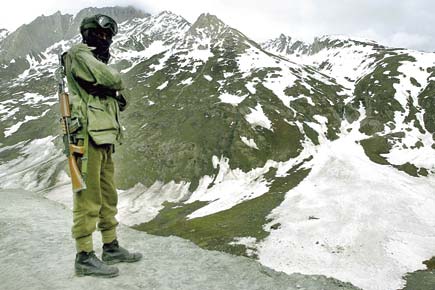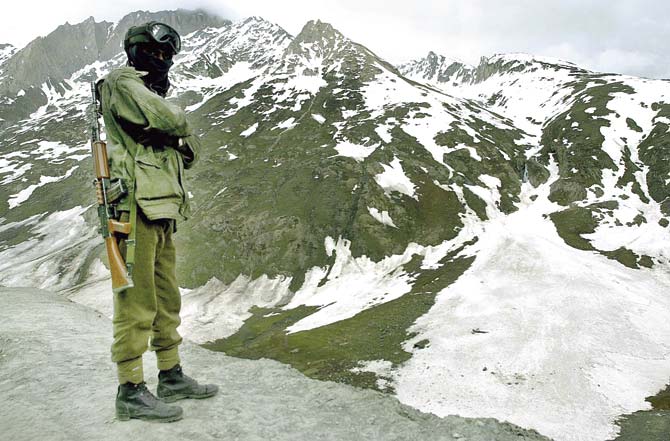Should a former Intelligence chief have written a book in which he revealed secrets that were, at best, open secrets but now have been verified as true? Mr AS Dulat was chief of the Research and Intelligence Wing (R&AW) from 1999 to 2000 and post retirement he was advisor to Prime Minister Vajpayee on Kashmir affairs

 Should a former Intelligence chief have written a book in which he revealed secrets that were, at best, open secrets but now have been verified as true? Mr AS Dulat was chief of the Research and Intelligence Wing (R&AW) from 1999 to 2000 and post retirement he was advisor to Prime Minister Vajpayee on Kashmir affairs.
Should a former Intelligence chief have written a book in which he revealed secrets that were, at best, open secrets but now have been verified as true? Mr AS Dulat was chief of the Research and Intelligence Wing (R&AW) from 1999 to 2000 and post retirement he was advisor to Prime Minister Vajpayee on Kashmir affairs.
 An Indian soldier guards the highway leading to Kashmir’s Kargil area in 2001. Former Intelligence chief AS Dulat knows a lot about how India handled the Kashmir issue in those crucial years when we fought the Kargil war. Pic/AFP
An Indian soldier guards the highway leading to Kashmir’s Kargil area in 2001. Former Intelligence chief AS Dulat knows a lot about how India handled the Kashmir issue in those crucial years when we fought the Kargil war. Pic/AFP
ADVERTISEMENT
Quite naturally Mr Dulat knows a lot about how India handled the Kashmir issue in those crucial years when we fought the Kargil war, picked up the pieces and reconstructed. There was also the Kandahar hijack and Kashmir militancy. AS Dulat saw all this from very close quarters and was party to many decisions.
The Prime Minister’s office and the various wings of the government handling information dissemination had excellent relations with the media. This does not mean that the media was spineless or completely co-opted. But there was a deeper understanding of issues. Not the Kandahar hijack episode. That is another story. There were daily briefings and interactions with reporters and editors where the Kashmir issue was explained in great detail. India’s position, its difficulties in managing perception internationally, and that at the same time, Kashmir could not be allowed to slip into the mess that was the ’90s, was discussed with the media.
India almost lost Kashmir in the ’90s. Dulat became Chief of R&AW only at the fag end of that period. Consolidating the gains made by breaking the back of separatism was the biggest task. The various intelligence organisations and political leadership in the period that Dulat was chief and in the PMO, had to try and bring the Hurriyat, the Abdullahs and other politicians on to the negotiating table. Wean them away from Pakistan that had no intention to deliver, but promised Azadi.
The Abdullahs were friends with Vajpayee and Dulat, which made the task easy. The Hurriyat was at the other end of the spectrum. The likes of Robin Raphael (former CIA analyst who served as political counselor at the US Embassy) had made them feel invincible.
Secret operations are necessary tools of war and peace. Every country, including India uses them. The Vajpayee administration used it too. There is nothing moral about covert operations undertaken by intelligence agencies and nothing morally right or wrong in the decision to use them. But then morally right decisions do not always produce the outcome that is good for the nation.
It should come as no surprise to us that the R&AW, the IB, the MI and, to that matter, even the administration of Farooq Abdullah bribed, gave incentives, tricked, used sabotage, were ruthless and far removed from fair play while dealing with separatists and militants. Some find it repugnant. Others feel it needed to be done and was done.
Every country has a threshold level of tactics it would employ to achieve its endgame. And no intelligence agency will reveal what that threshold level is. Not even the US. A lot has been written and debated about how intelligence is manipulated to suit the political aims of the head of state or government. The most famous being CIA director George Tenet who has gone down in history for his intelligence advice to President George Bush that it was a “slam-dunk” that Saddam Hussein possessed weapons of mass destruction. “George, how confident are you?” the president asked Tenet. “Don’t worry, it’s a slam-dunk,” Tenet said. (Bob Woodward’s book Plan of Attack). America attacked Iraq and “slam dunk” is in history books now.
Tenet wasn’t the only one who provided the intelligence the Boss wanted instead of the intelligence the Boss should have had, and he wont be the last.
“The first casualty of war is truth,” said Rudyard Kipling. And in the world of spies and their work, nothing is black and white. They work in shadows, they deal with half-truths and pure lies. Their world revolves around people they cannot trust. In most times, they have to make people betray their country and families. Spies are privy to decisions that lead to wars; that overturn governments, leaders who are protected that must not be. Saving of lives and loss of lives. And, during all this time, they have to not speak about it, even to their own families.
It isn’t easy. In their later years, spies and generals talk. The burden of silence is too heavy to bear. They are not your average citizens. They are worthy of respect and definitely worth reading.
Smita Prakash is Editor, News at Asian News International. You can follow her on Twitter @smitaprakash
 Subscribe today by clicking the link and stay updated with the latest news!" Click here!
Subscribe today by clicking the link and stay updated with the latest news!" Click here!







